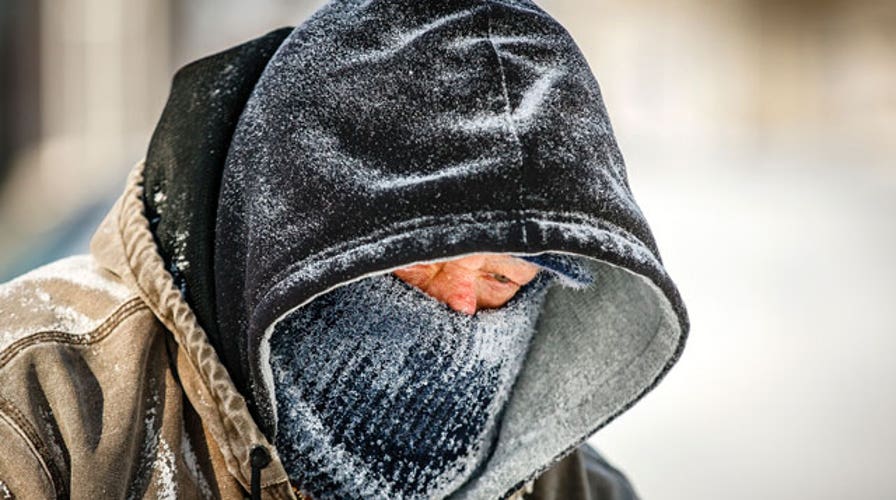The so-called "polar vortex" of dense, frigid air blamed for at least 21 cold-related deaths across the country spread to the East and the Deep South on Tuesday, shattering records that in some cases had stood for more than a century.
Temperatures on Tuesday morning were already at 8 degrees in Atlanta and 6 degrees below zero at a remote weather station in the north Georgia mountains -- the coldest temperatures in the state for years. Temperatures hit lows in parts of West Virginia not felt for 25 years, while the extreme cold in Virginia beat record lows that had stood since the late 1950s. The National Weather Service said the mercury bottomed out at 3 degrees before sunrise at Baltimore-Washington Thurgood Marshal International Airport, with a wind chill of minus 16.
New York City's Central Park broke a 118-year-record Tuesday morning when the temperature there dropped to 4 degrees. It's previous record of 6 degrees had stood since 1896, according to MyFoxNY.com.
Monday's subzero temperatures also smashed records in Chicago, which set a record for the date at minus 16, and Fort Wayne, Ind., where the mercury fell to 13 below. Records also fell in Oklahoma and Texas, and wind chills across the region were 40 below and colder. Officials in states like Indiana already struggling with high winds and more than a foot of snow urged residents to stay home if they could.
The cold turned deadly for some: Authorities reported at least 21 cold-related deaths across the country since Sunday, including seven in Illinois, and six in Indiana. At least five people died after collapsing while shoveling snow, while several victims were identified as homeless people who either refused shelter or didn't make it to a warm haven soon enough to save themselves from the bitter temperatures.
In Missouri on Monday, a 1-year-old boy was killed when the car he was riding in struck a snow plow, and a 20-year-old woman was killed in a separate crash after her car slid on ice and into the path of a tractor-trailer.
Forecasters said some 187 million people in all could feel the effects of the "polar vortex" by the time it spreads across the country. Tennessee utility officials on Tuesday braced for near-record power demand, while Ohio prepared for its coldest temperatures in decades.
Wind chill warnings stretched as far south as Florida, where cold weather shelters opened up from St. Petersburg to Pensacola on Monday.
At the Water Front Rescue Mission in Pensacola, which ordinarily serves just men, the shelter was opening its doors to women and children. The shelter can accommodate about 250 men and perhaps another 100 women and children, said Mick Breault, president of Water Front Rescue Mission.
"We will open our doors to everyone until we fill up," he said.
A hard freeze warning is in effect for the Tampa Bay area from 9 p.m. Tuesday to 7 a.m. Wednesday, according to the National Weather Service. Hard freeze warnings were issued Monday for the northern half of the state and extended as far south as Hernando, Lake, Sumter and Volusia counties. Freezing temperatures in north Florida could last for 18 hours overnight Monday and into Tuesday, as well as another 15 hours from Tuesday night into Wednesday.
In central Florida, temperatures are expected to dip below freezing Tuesday night.
The cold weather has also forced the cancellations and delays of thousands of flights, leaving travelers stranded at airports. Southwest Airlines Co. spokesman Brad Hawkins said that the extreme cold is making tasks such as refueling so much longer and more difficult that it the airline can't keep its usual schedule.
As of Wednesday morning, more than 500 flights were canceled across the U.S. and more than 100 were delayed, according to the flight tracking website FlightAware.com.
On Tuesday, more than 2,500 flights were canceled and more than 6,000 were delayed, FlightAware.com statistics show.
JetBlue resumed some flights in the Northeast Tuesday morning and expects to return to full operation at four affected airports by mid-afternoon. Some passengers at Boston's Logan Airport had been stuck for two days, sleeping on cots and chairs.
PJM Interconnection, which operates the power grid that serves more than 61 million people in the Mid-Atlantic, Midwest and South, asked users to conserve electricity because of the cold, especially in the morning and late afternoon.
Across the South, the Tennessee Valley Authority said power demand in the morning reached the second-highest winter peak in the history of the Depression-era utility. Temperatures averaged 4 degrees across the utility's seven-state region.
In South Carolina, a large utility used 15-minute rolling blackouts to handle demand, but there were no reports of widespread outages in the South.
Natural gas demand in the U.S. set a record Tuesday, eclipsing the mark set a day earlier, according to Jack Weixel, director of energy analysis at Bentek Energy.
In Chicago, it was too cold even for the polar bear at the Lincoln Park Zoo. While polar bears can handle below-zero cold in the wild, Anana was kept inside Monday because she doesn't have the thick layer of fat that bears typically develop from feeding on seals and whale carcasses.
The Associated Press contributed to this report.


